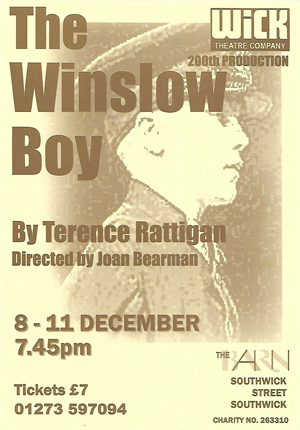JB wrote: “This play is based on a real court case which took place in 1910 – that of George Arthur Shee, a naval cadet, who becomes Ronnie Winslow in the play.
Ronnie is accused of stealing a postal order while at naval college and is expelled. His father is determined to prove Ronnie’s innocence and tries to engage barrister Sir Robert Morton to fight the Admiralty. The play shows the effects on the family and friends and brilliantly highlights the society, politics and attitudes of the time”
Publicity #1: The Winslow Boy
Publication: Shoreham Herald
Publication Data: December 03 2004
Text Header: Let right be done
Text: Content
WAS Ronnie really guilty? That’s the question dominating this popular classic family drama The Winslow Boy.
Set in the years before the First World War, The Winslow Boy, by Terence Rattigan, has been chosen by Wick Theatre Company to mark its 200th production.
Young Ronnie Winslow arrives home, tearfully protesting his innocence, having been expelled from the Royal Naval College, Osborne, for allegedly stealing a five-shilling postal order.
His father Arthur will stop at nothing in order to clear his son’s name.
Arthur’s spending drastically reduces the family income, so wife Grace, his fun-loving elder so Dickie and daughter Catherine, who works in support of the Suffragettes, find their lives irretrievably altered.
The case becomes famous, attracting much unwelcome attention from both public and press.
The play captures perfectly the typically repressed emotions of the upper classes in the early 20th century.
Director Jan Bearman has chosen a cast featuring both well known and nearly new faces.
The Winslow Boy will be performed at the Barn Theatre, Southwick, from Wednesday December 8, to Saturday, December 11, at 7.30pm. Tickets £7.
Call the box office on 01273 597094
Review #1: The Winslow Boy
Publication: Shoreham Herald
Publication Data: December 17 2004
Reviewer: Jeremy Malies
Text Header: Courtroom drama still rlevant today
Text: Content
THE Winslow Boy is based on the true story of a 13-year-old naval cadet, who was wrongly accused of stealing a five-shilling postal order in 1910, a slur which prompted his father to take extraordinary measures to clear his boy’s name. A play which revolves around a court case championing the individual against bureaucratic bungling id bound to resonate today. It was presented by the Wick Theatre Company at the Barn in Southwick. But given the outstanding work I have seen from the Wick earlier in the year, this topical offering came as a disappointment.
As Winslow Senior, Derek Fraser was outstanding: he gave a subtle, multi-layered performance depicting a man of fierce integrity and an iron will, which only wilts under physical and financial duress. Without ever being ‘fishlike’, an adjective to which Rattigan returns several times, Peter Thompson gave a solid interpretation of the barrister Sir Robert Morton. However, he needed to be syllable perfect in his initial interrogation of the cadet, if this crucial episode is to work, and on Saturday fell short. Ray Hopper also gave a solid performance as the loyal family solicitor, but I felt he was mis-cast since if his love for Catherine is to have poignancy, there must be some credibility to his slender hope the feelings might be returned. A gulf in ages ruled this out.
Costumes were first-rate, the stage being immediately convincing as an Edwardian drawing room in Kensington. Although I felt the production, at times, failed to engage, the play still worked and crept up on you unobtrusively during the final half-hour. In a week that saw increased concern over Deepcut Barracks and proposed ID cards, debate over euthanasia and increased unease at Guantanamo imprisonments, Rattigan’s call to arms remains thrilling: “Let right be done”.
Review #2: The Winslow Boy
Publication: Brighton Argus
Publication Data: Decembe 11 2004
Reviewer: Barrie Jerram
Text Header: The price of justice
Text: Content
Terence Rattigan, once the darling of the west End, fell out of favour when the ‘kitchen-sink’ school of theatre took over in the ’50s. At the moment though his work seems to be undergoing a mini revival. Hard on the heels of the Theatre Royal’s recent production of Man and Boy and another film version of The Winslow Boy comes this offering from The Wick Theatre Company.
Set on the eve of the First World war the play tells the story of Ronnie Winslow, a young naval cadet, who is expelled from his college accused of stealing a five-shilling postal order from one of his classmates. Based on the true case of George Archer-Shee that created a political furore at the time, the play concentrates on the battle of the boy’s father to clear his son and the price that the family pay for justice. The father sacrifices his health, the sister her impending marriage and the whole family suffers financial hardship.
Despite the craftsmanship of Rattigan’s writing in depicting the society, politics and attitudes of the time, the play does at times creak a little and begins to show its age, particularly in the first Act. It took a long while before any dramatic tension was built up but when it did the cross-examination scene between Sir Robert Morton QC and the boy fairly crackled with electricity. It would be fair comment to say that following the arrival of Morton the play lifts off. However, the issues raised by the play are not dated. A father’s fight for justice is still pertinent today as is the right to fight that the radical daughter espouses.
There were exceptionally fine performances from the three principal characters. Derek Fraser captured well the dual aspects of the father’s character – gentle dignity and steely determination – and was most convincing in depicting the man’s failing health. As Catherine, his daughter, Claire Wiggins had a difficult task of portraying a feisty radical without turning her into a caricature. This she did well and at the same time blended her political passion with a gentleness especially when speaking of her love for her fiancé. She was particularly impressive in her exchanges with Morton. She was well matched by a forceful performance from Peter Thompson as the barrister.
It was encouraging to see Chris Morgan step up from the Youth Section. However there is a point that he will have to watch and that his posture. He has a tendency to slouch that in this production did not fit the character of a Naval Cadet. Also by dropping his head his words at times disappeared into his chest instead pf projecting out to the audience. This was particularly noticeable in the opening scene with the maid, Joan Braddock, who also had a problem projecting. She later made up for this in a scene after the trial when she fully realised her comic potential.
In the main there was strong support from the rest of the cast, with Ray Hopper giving a delightfully understated performance that gave his character just the right amount of pathos.
[/showhide]





